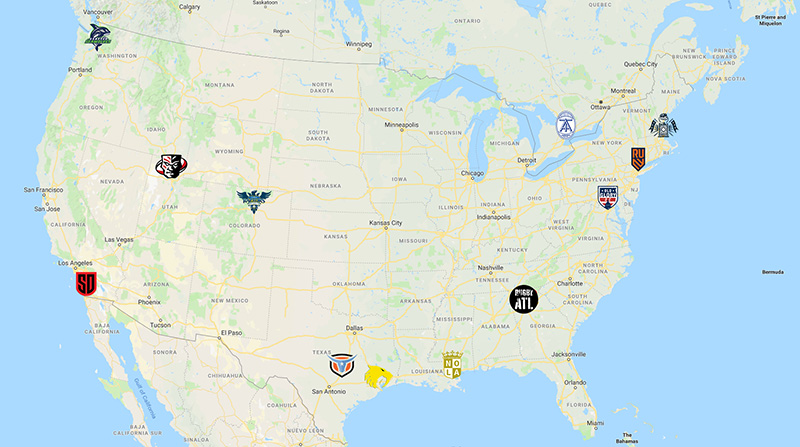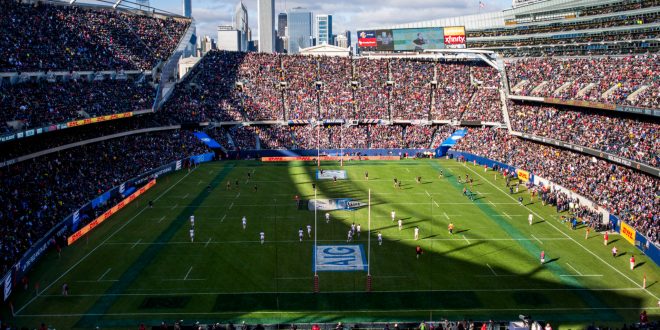World Rugby has hinted that the hosting rights to RWC 2031 will be determined together with RWC 2027. This would mirror the RWC 2015 and 2019 decision, which granted England with Wales, and Japan the tournaments.
There are benefits to confirming two tournaments at once, with World Rugby noting that this facilitates a new market. North America fits into this category and, as such, a hypothetical North American RWC looms as more plausible in 2031 than 2027.
There are three varieties of a hypothetical RWC in the Americas. They are (a) a RWC in the USA; (b) a RWC in Canada; or (c) a combined North American hosted RWC. The first two have been considered in prior articles.
To access the Rugby World Cup in the Americas: USA article click here.
To access the Rugby World Cup in the Americas: Canada article click here.
RWC HOSTING CRITERIA
A crucial factor of hosting a Rugby World Cup is strong financial standing. This does not mean that the host union is required to be wealthy, but that the hosting model will bring World Rugby a sizable profit. The hosts do not profit from advertising nor from television revenue. What they do gain is the ticket revenue.
Part of the bidding process is to have government support. A hypothetical combined RWC in North America would thereby be more expensive and would also likely enable a larger number of tickets, to cover the expenses, than either a Canada or a USA solo hosted competition.
World Rugby requires a stadium seating 60,000 spectators for the RWC Final. There is no official size for the remaining venues, which gives hosts the liberty to use a variety of venue sizes. Prior RWCs under the existing model that included venues seating below 20,000 are RWC 2003 in Launceston and Wollongong; RWC 2011 in Invercargill, Nelson, Palmerston North and Whangarei; RWC 2015 in Exeter and Gloucester; and RWC 2019 in Kamaishi.
For RWC 2023 the smallest venue is to be Toulouse, which seats 33,150 spectators. It is one of nine venues with Paris, Marseilles and Lyon all seating 60,000 or more.
RUGBY HOSTING EXPERIENCE
Neither Canada nor the USA have ever bided to host a RWC. Japan 2019 was the second bid from the Asian country. It followed a failed effort to secure the rights to host RWC 2011.
Both countries have received home crowds that are comparable to RWC matches. These include 61,500 for the USA vs New Zealand in Chicago in 2014 and 29,480 for Canada vs Maori All Blacks in Toronto in 2017. By way of comparison, 70,103 attended the RWC 2019 Final in Yokohama; 21,069 were at Osaka for Fiji vs Georgia; and 14,025 attended Fiji vs Uruguay in Kamaishi.
Both Canada and the USA are important to World Rugby in Rugby Sevens. Vancouver’s BC Place received a total of 73,819 supporters over two days for the 2019 Canada Sevens; while more than 100,000 attended the 2018 Sevens World Cup in San Francisco’s Oracle Park over three days.
WHERE TO HOST RWC MATCHES
Professional rugby would be a feature of a RWC in North America. The Major League Rugby cities would be natural markets, although they would likely be lonely use rather than strictly use as the hosting model. Chicago, for instance, holds the North American attendance record yet the city, and Mid-West region lacks a MLR team. Moreover, Canada has one team yet this need not mean Toronto would be Canada’s only venue for a RWC 2031 in North America.

ACCESSIBILITY
Big cities are prime locations for matches. This relates to the accessibility for teams and traveling supporters. Furthermore, the share size of Canada and the USA mean that flying is to be the mode of transport and also that regionalizing pools is probable.
In RWC 2013, all matches in Perth were Pool C fixtures. This concept could be used in North America, even across all of the four pools.
As noted in both Rugby World Cup in the Americas: USA and Canada articles, hub airports would be vital at connecting teams and traveling supporters from one game to the next. If World Rugby could obtain United and Air Canada as carriers this would be nothing short of tremendous.
United and Air Canada are partners in the Star Alliance. The former has hubs in Denver, Houston, Los Angeles, New York (Newark), Washington (Dulles), Chicago and San Francisco; and the latter in Montreal, Toronto, Calgary, and Vancouver.
VENUE SELECTION
A co-hosted North America 2031 could have as few as nine venues. Such a scenario would most likely require heavy use of NFL and CFL venues. However, past RWC tournaments illustrate the importance of balance and, as such, a range of stadium capacities is more plausible.
In theory, the tournament could be played in a number of places. For instance, there is a case to be made that the Pacific region could host all by itself. California could have four venues – Los Angeles, San Diego, San Francisco and Sacramento. Add Vancouver, Seattle, Portland, and stretch to Las Vegas and Salt Lake City, and it is a model of nine venues to match France 2023. This possibility is not likely, however, with more regions meriting matches.
From east to west the regions could be:
- Atlantic – Boston, New York, Atlanta, Montreal
- Central – Toronto, Hamilton, Chicago, Houston
- Rockies – Denver, Salt Lake City, Calgary
- Pacific – Vancouver, Seattle, San Francisco, Los Angeles
Fifteen venues is three more than RWC 2019, but three less than RWC 1999. The second RWC hosted in Europe was Wales 1999, yet it had matches played in England, France, Ireland, and Scotland. It mixed large national stadiums with traditional grounds. It is this RWC which arguably offers the hosting model for North America 2031.
Pools were spread per country in 1999. Argentina played all pool games in Wales; Canada did so in France; the USA only played in Ireland; and Uruguay played all matches in Scotland. Argentina reached the play-off’s to face Ireland in Lens, France; and France in Dublin, Ireland.
Sample host cities and venues are displayed from east to west below:
| CITY | VENUE | CAPACITY |
| Boston | Alumni Stadium | 44,500 |
| New York (Harrison, NJ) | Red Bull Arena | 25,000 |
| Atlanta | Bobby Dodd Stadium | 55,000 |
| Montreal | Stade Saputo | 20,801 |
| Toronto | Rogers Center | 52,230 |
| Hamilton | Tim Hortons Field | 23,218 |
| Chicago | Soldier Field | 61,500 |
| Houston | BBVA Compass Stadium | 22,000 |
| Denver | DSG Park | 19,680 |
| Salt Lake City | Rio Tinto Stadium | 20,213 |
| Calgary | McMahon Stadium | 46,020 |
| Los Angeles | Dignity Health Sports Park | 30,000 |
| San Francisco | Oracle Park | 42,000 |
| Seattle | CenturyLink Field | 68,000 |
| Vancouver | BC Place | 54,500 |
VERDICT
A co-hosted Canada and USA RWC is plausible. For Canada it is more realistic than hosting alone, although this would mean fewer matches. Five of the fifteen venues and cities listed in this proposal are Canadian and ten are U.S. cities. Notwithstanding, Toronto and Vancouver would both be Quarter Final and Semi Final contenders.
Chicago Field would be the leading candidate to host the RWC Final. The opening match could also be played at the venue, thereby having the Eagles play at the venue. The range of capacities at the remaining venues would ensure both (a) adequate options for prime matches and (b) a decreased risk of lowly attended fixtures.
Chicago’s semi-central location would also enable the spreading of prior play-off’s fixtures. If the 20-team format continues then there could be a geographical divide for quarter finals and semi finals. This scenario could work as follows:
| FIXTURE | VENUE |
| Quarter Final 1 | Boston |
| Quarter Final 2 | Atlanta |
| Quarter Final 3 | Seattle |
| Quarter Final 4 | San Francisco |
| Semi Final 1 | Toronto |
| Semi Final 2 | Vancouver |
| Bronze Final | Chicago |
| Final | Chicago |
If World Rugby expand the RWC to 24 teams then the model would expand to incorporate a round-of-16. This could be managed with the same geographical organization.
North America 2031 would require the backing of both governments and would be a coalition between USA Rugby, Rugby Canada and World Rugby. It is possible for 2031, although, it would require unprecedented work and compromise.
 Americas Rugby News Rugby news from across the Americas!
Americas Rugby News Rugby news from across the Americas!




